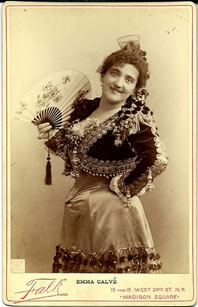
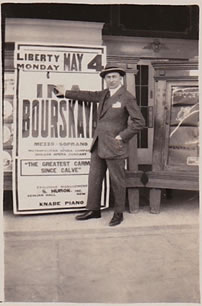
Carmen belongs to the legendary roles of Grand Opéra. Bizet’s twenty-four karat masterpiece, a standard item in most repertoires since its birth in 1875, seems at the present time not only able to hold its own but actually to fortify its position.
CARMEN and Carmens


Carmen belongs to the legendary roles of Grand Opéra. Bizet’s twenty-four karat masterpiece, a standard item in most repertoires since its birth in 1875, seems at the present time not only able to hold its own but actually to fortify its position.
Carmen is the favorite role of every contralto and mezzo sopranos and is endeared to the hearts of certain dramatic and even lyric sopranos. Many of the great ladies have attempted it early in life; discovered ‘it was not for them” and regretfully dropped it. (I think particularly of Mmes Schumann-Heink and Louise Homer ) More than one fading prima donna, has during the closing days of her career attempted to recapture waning favor by appearing in the tried-and-true opus.(Here courtesy forbids the mentioning of names)
There are those who also stop in the midst of brilliant careers to learn and sing the role, feeling their experiences are not complete until they have sung it. At this point we call to mind Rosa Ponselle and Maria Jeritza. Last but not least there is the artist who don the shawl and castanets early in life and who are waving fans and singing séguidillas right to the end of their operatic days. They are so numerous a comprehensive list would require a whole volume, but one can pause to mention Emma Calvé, Maria Gay, Geraldine Farrar and our superb Mary Garden.
Hardly an opera season passes either in New York or Chicago without providing an opportunity to compare two or more exponents of the role. In the season just closed in Chicago we heard three violently dissimilar Carmens, each with her own particular superiorities. I can think of no other role providing more opportunity for ingenuity, novel interpretation, fresh conception and frequent revision. Some of the more durable Carmens vary their performances from year to year and periodically lift the faces of their familiar interpretations.
This season’s Carmens in Chicago were Ina Bourskaya(click here to read her biography) who sang it during the visit of the San Carlo company, Gertrud Wettergren (click here to listen)who a year ago made her début with the Chicago City Opera in the role, and Coe Glade, long familiar in the part here.
Mme. Bourskaya whose vocal lustre is beginning to fade compensates by emphasizing everything which is wanton, vixenish and gross in the character, achieving in the end a rather vivid picture of a bad, bad girl. Vocally her performance matches her impersonation, the tone production being throaty, husky and the musical effect sinister. Occasionally her voice achieves a gorgeous coarseness, an incomparable dramatic asset for the part.
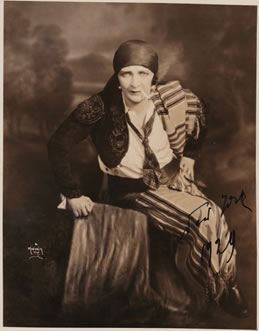
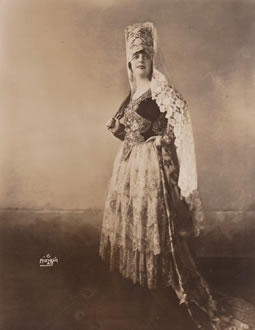
(IB as Carmen, courtesy Charles Mintzer)
Mme. Wettergren, on the other hand, is still young, chronologically and vocally. Her voice has all the warmth, brilliance and allure which the role could possibly endure. If her singing were anymore dulcet Mme Wettergren could not be a Carmen at all! Dramatically, her deportment is original, energetic and artistic, but somehow, at the end of the evening she leaves the impression of being rather a lady underneath it all. There are in her performance however, touches of dramatic ingenuity so interesting they should not pass without comment. For example, in act one, after José has already tied her wrists and she is getting ready to sing the Séguidilla, she drags José’s chair half way across the stage to the center footlights where she proceeds to chant her seductive air. And, unless my memory fails me, she gets through the whole performance without smoking (or even lighting) a cigarette. So far as I know this is an innovation. Most Carmens see fit “to keep burning” through the whole performance. I rejoice to add that Mme. Wettergren’s Chicago Carmen was sung in French.
I’m told that when she sang it first at the Metropolitan she did it in Swedish, surely the first time that red and gold hall of song, rang to this particular novelty! Her having learned the original French in the meantime saves me considerable critical comment.
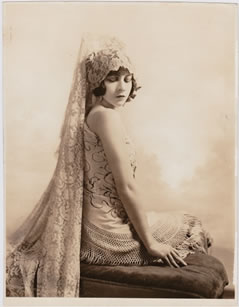
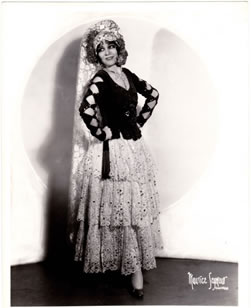
(CG as Carmen, courtesy Charles Mintzer)
Miss Glade (click here to listen), the third of the season’s Carmens, is, in some respects the most interesting, In the first place, there is something unmistakably Hollywoodish about Miss Glade that I’m never quite able to take her seriously as a prima donna. I find myself approaching her Carmen almost as if Helen Morgan or Libby Holman were singing it (This is not intended as a comparison of voices). And yet, half way through the first act one becomes reconciled to the (heavy) excessive make up and concentrates on the splendors of a voice beautifully suited to the part. Dramatically Miss Glade is vixenish, wanton and sometimes pleasantly playful.
Charles Jahant, Chicago 1937